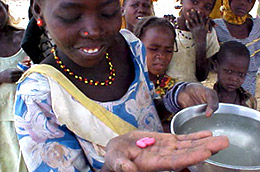Financial Management and Sustainability
Although the END in Africa project’s primary focus is on strengthening NTD country programs as a means of ending neglected tropical diseases (NTDs) in each country, the capacity building activities it provides also strengthen national health systems and other governmental agencies. They also help to strengthen collaboration and reinforce working relationships among government agencies at the national, regional and local levels.
END in Africa’s sustainability approach continues to look beyond resource mobilization, and is embodied through the strengthening of four foundational “building blocks” of financial analysis and strategy, advocacy and communications, strategic social partnerships, and organizational capacity.
END in Africa’s efforts are on track to reach the following goals by the end of the fiscal year:
- Enhance government leadership and performance management efforts, including financial management and the effective use of data and information for planning, programming, and decision making.
- Increase sustainability planning and advocacy efforts to diversify partners and mobilize resources to improve financial stability of programming efforts.
- Update NTD master plans to maximize the efficient use of available resources for greater public health impact in NTD programming.
- Advance the knowledge and awareness of NTD operational performance management, sustainability, and partnerships through documenting and disseminating lessons learned.
Key activities over the past six months demonstrate END in Africa’s commitment to improving national NTD program (NTDP) sustainability:
- Tool for Integrated Planning and Costing (TIPAC) update and data use for policy and program decision-making:
- Cote d’Ivoire & Togo: analyzed updated TIPAC data outputs for both countries to support data use for decision making.
- Ghana: worked with the NTDP to leverage analytics and visualization tools and to develop a summary of findings from the TIPAC to support resource allocation decisions.
- Partnership engagement and development:
- Cote d’Ivoire & Togo: each country identified two priority partners, developed tailored business cases for each, and requested meetings with potential partners to submit their proposals.
- Ghana: worked with both the NTDP and the Policy, Planning, Monitoring and Evaluation Department (PPMED) to apply concepts and knowledge acquired at the April 2017 “Sustainability Planning and Business Case Development” workshop. The skills gained from the workshop enhanced the ability of the NTDP and PPMED to engage CAL Bank, Ecobank Foundation, uniBank, and Stanbic Bank Ghana to provide additional resources for NTDs.
- Advocacy strategies:
- Cote d’Ivoire: supported the NTDP leadership team in the advocacy strategy and resource mobilization plan review process, including the development of key messages and a tailored value proposition for the plan.
- Togo: helped the NTDP develop a tailored advocacy strategy and a resource mobilization plan, which were approved and adopted by the program’s leadership in July 2017.
In addition, the END in Africa project has supported the following activities in the financial management arena:
- Training on US Government financial rules and regulations as well as on financial policies specific to the END in Africa project.
- Financial performance and planning workshops to address financial issues affecting NTD country programs.
- Financial sampling of MDA expenditures in the offices of project sub-grantees to ensure standardization and adherence to established financial policies.
- Supporting health officials charged with completing utilization reports following MDA activities.
- Making recommendations to increase the efficiency of financial processes and improve compliance with procedures within sub-grantee offices and at the district level.

Photo Credit: ntd-ngdonetwork.org

